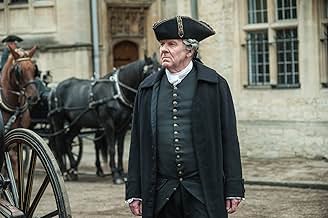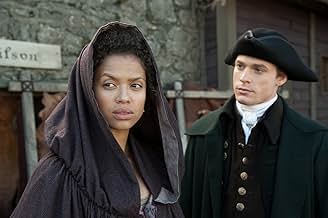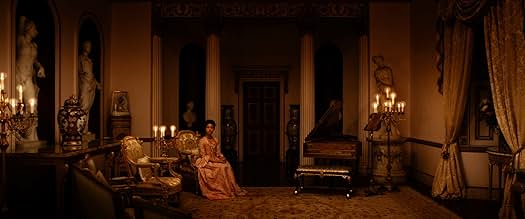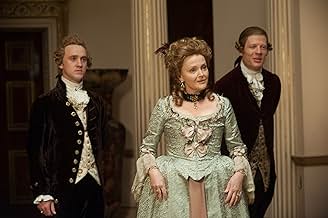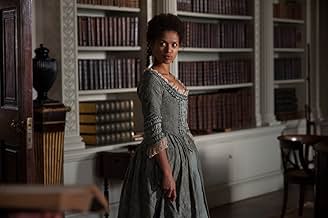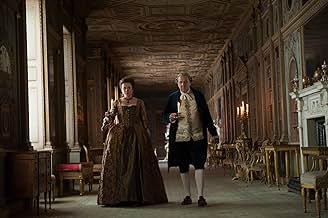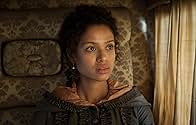AVALIAÇÃO DA IMDb
7,3/10
34 mil
SUA AVALIAÇÃO
A filha do capitão da Marinha Real Sir John Lindsay, Dido Elizabeth Belle, é criada por seu aristocrático tio-avô Lord William Murray, o primeiro Conde de Mansfield na Inglaterra do século X... Ler tudoA filha do capitão da Marinha Real Sir John Lindsay, Dido Elizabeth Belle, é criada por seu aristocrático tio-avô Lord William Murray, o primeiro Conde de Mansfield na Inglaterra do século XVIII.A filha do capitão da Marinha Real Sir John Lindsay, Dido Elizabeth Belle, é criada por seu aristocrático tio-avô Lord William Murray, o primeiro Conde de Mansfield na Inglaterra do século XVIII.
- Prêmios
- 13 vitórias e 32 indicações no total
Avaliações em destaque
...that Peter Saunders must have been watching a different movie. I don't agree with him at all. I enjoyed this movie to the fullest. Though the ending was a bit predictable, the acting, sets (incredible), and story were wonderful. The costume designer should win an award...As well as the set designer. Don't let his review keep you from seeing this film. Watch it, enjoy it, and see for yourself if you like it. Seven bucks well spent. If you like period pieces, go see it. The sets alone are worth the trip. And the lead actress was both beautiful and played her role very well. Maybe there weren't enough explosions or CGI to make Peter happy...
10dediggs
This movie is most likely not playing at a theater near you, but it is so worth traveling to see. The acting was superb! I don't remember a movie in recent times that I enjoyed so much. The story touched my heart as a person of mixed African descent. It showed how then and now too much emphasis is placed on skin color. It showcased people (both white and black) that were willing to stand up for what is right. I don't find this kind of movie to be controversial as it will do so much to enlighten people to historical facts that cannot be denied.
The costumes were so beautiful and some were on display at the Landmark Theater in Los Angeles. The audience clapped and cheered at the end of the movie and were raving about the movie as they left the theater.
The costumes were so beautiful and some were on display at the Landmark Theater in Los Angeles. The audience clapped and cheered at the end of the movie and were raving about the movie as they left the theater.
Only recently has the truth been universally acknowledged that Sir Walter's fortune in 'Persuasion' almost almost certainly came from the slave trade. 'Belle', like most modern period films sugars it's pill with lavish decor and beautiful exteriors; but the emphasis as usual is on talk - much of it - about property, money and influence.
The elder women know to the nearest pound the value of potential suitors, to whom their daughters are sold off like cattle. There's an interesting subplot concerning the jettisoning of slaves by traders whose sole concern is the cash value of their cargo. An interesting subtext on which the film chooses not to elaborate is whether the fabulously wealthy heroine would identify any more with her black servant if she was just a commoner.
The elder women know to the nearest pound the value of potential suitors, to whom their daughters are sold off like cattle. There's an interesting subplot concerning the jettisoning of slaves by traders whose sole concern is the cash value of their cargo. An interesting subtext on which the film chooses not to elaborate is whether the fabulously wealthy heroine would identify any more with her black servant if she was just a commoner.
Although "Belle" tells a highly fictionalised account of her life, Dido Elizabeth Belle Lindsay was a real person. She was the illegitimate daughter of a British naval officer and a black slave. Unlike many children born in similar circumstances, however, she was fortunate in that her father acknowledged her and paid for her keep. When her mother died, her father brought her from the West Indies to England and entrusted her to the care of uncle, Lord Mansfield, who just happened to be the Lord Chief Justice. When her father died she inherited his fortune, making her a desirable heiress.
This is essentially a Jane Austen story, set a generation earlier and with a racial element thrown in. The film centres on Dido's emotional relationships. She is sought in marriage by Oliver Ashford, the younger son of an aristocratic family, but his interest is largely financial and the match is fiercely opposed by his mother and his elder brother, both of whom object to the idea of a mixed-race woman marrying into their family. The great love of her life is John Davinier, a clergyman's son, an aspiring lawyer and an ardent anti-slavery campaigner.
At her uncle's stately home Kenwood House, Dido is placed in a strange and anomalous position. By reason of her fortune she is an insider, part of England's establishment; Mansfield even worries that, because of the disparity in their financial positions she might be "marrying beneath herself" if she accepts John. Her race and her illegitimacy, however, make her an outsider. She is allowed to dine with the family when they are alone, but is forced to eat separately when they have guests who might be upset by the sight of a black face. Her position contrasts strangely with that of her cousin and close friend Lady Elizabeth Murray, another niece and ward of Lord Mansfield. Elizabeth is legitimate, but has no fortune of her own, having been virtually disowned by her father under the influence of his second wife. Yet because she is white there can be no question of Elizabeth having to dine apart from the family.
Set against the love of Dido and John is a subplot about what became known as the "Zong case". When sickness broke out on a slave ship, the captain ordered the crew to throw the slaves overboard. When the insurance company refused to compensate the ship-owners for their losses, the owners sued. Lord Mansfield was the judge who heard the case in the Court of King's Bench.
Tom Wilkinson has given a number of fine performances in recent British films (and sometimes in Hollywood too), and this is one of his best. In his dealings with Dido, whom he loves dearly, Mansfield is torn between his inner decency and the need to conform to the social proprieties of the period. In legal matters he is equally torn between the demands of the law and those of justice, which is not always the same thing. In the "Zong" case he is well aware that, in refusing to pay out on the policy the insurers are motivated by commercial considerations, not humanitarian ones; if they had any humanitarian feelings they would not have become involved in facilitating the slave trade in the first place. Nevertheless, he is equally well aware that a decision against the ship- owners will be seen as a victory for the growing anti-slavery movement and a step on the road to the abolition of the slave trade. Other good performances come from newcomer Gugu Mbatha-Raw in the leading role, Penelope Wilton as Lord Mansfield's sister and Sam Reid as John.
The film has something in common with "Amazing Grace", another film about the abolitionist movement; both tend to suggest that the fight against slavery was something waged by upper-class people in wigs sitting in elegant Georgian drawing-rooms, although "Belle" does at least put a black character at centre stage. Dido, moreover, would have known about the horrors of slavery through personal experience, whereas the likes of John Davinier and Lord Mansfield only know about them at second hand. For this reason I would have liked to see more about Dido's childhood in the West Indies before the death of her mother.
As one might expect of a British costume drama, "Belle" is visually attractive, but it is more than a mere pretty face. The "heritage cinema" genre is sometimes dismissed as a mere exercise in sentimental nostalgia, but it can be much more than that. It can also be (as in much of the work of Merchant-Ivory) a vehicle for exploring significant issues, and in this case manages to explore the questions of race, social class, compassion, justice and freedom. As Lord Mansfield put it, "Fiat justitia, ruat caelum". Let justice be done though the heavens fall. 8/10
This is essentially a Jane Austen story, set a generation earlier and with a racial element thrown in. The film centres on Dido's emotional relationships. She is sought in marriage by Oliver Ashford, the younger son of an aristocratic family, but his interest is largely financial and the match is fiercely opposed by his mother and his elder brother, both of whom object to the idea of a mixed-race woman marrying into their family. The great love of her life is John Davinier, a clergyman's son, an aspiring lawyer and an ardent anti-slavery campaigner.
At her uncle's stately home Kenwood House, Dido is placed in a strange and anomalous position. By reason of her fortune she is an insider, part of England's establishment; Mansfield even worries that, because of the disparity in their financial positions she might be "marrying beneath herself" if she accepts John. Her race and her illegitimacy, however, make her an outsider. She is allowed to dine with the family when they are alone, but is forced to eat separately when they have guests who might be upset by the sight of a black face. Her position contrasts strangely with that of her cousin and close friend Lady Elizabeth Murray, another niece and ward of Lord Mansfield. Elizabeth is legitimate, but has no fortune of her own, having been virtually disowned by her father under the influence of his second wife. Yet because she is white there can be no question of Elizabeth having to dine apart from the family.
Set against the love of Dido and John is a subplot about what became known as the "Zong case". When sickness broke out on a slave ship, the captain ordered the crew to throw the slaves overboard. When the insurance company refused to compensate the ship-owners for their losses, the owners sued. Lord Mansfield was the judge who heard the case in the Court of King's Bench.
Tom Wilkinson has given a number of fine performances in recent British films (and sometimes in Hollywood too), and this is one of his best. In his dealings with Dido, whom he loves dearly, Mansfield is torn between his inner decency and the need to conform to the social proprieties of the period. In legal matters he is equally torn between the demands of the law and those of justice, which is not always the same thing. In the "Zong" case he is well aware that, in refusing to pay out on the policy the insurers are motivated by commercial considerations, not humanitarian ones; if they had any humanitarian feelings they would not have become involved in facilitating the slave trade in the first place. Nevertheless, he is equally well aware that a decision against the ship- owners will be seen as a victory for the growing anti-slavery movement and a step on the road to the abolition of the slave trade. Other good performances come from newcomer Gugu Mbatha-Raw in the leading role, Penelope Wilton as Lord Mansfield's sister and Sam Reid as John.
The film has something in common with "Amazing Grace", another film about the abolitionist movement; both tend to suggest that the fight against slavery was something waged by upper-class people in wigs sitting in elegant Georgian drawing-rooms, although "Belle" does at least put a black character at centre stage. Dido, moreover, would have known about the horrors of slavery through personal experience, whereas the likes of John Davinier and Lord Mansfield only know about them at second hand. For this reason I would have liked to see more about Dido's childhood in the West Indies before the death of her mother.
As one might expect of a British costume drama, "Belle" is visually attractive, but it is more than a mere pretty face. The "heritage cinema" genre is sometimes dismissed as a mere exercise in sentimental nostalgia, but it can be much more than that. It can also be (as in much of the work of Merchant-Ivory) a vehicle for exploring significant issues, and in this case manages to explore the questions of race, social class, compassion, justice and freedom. As Lord Mansfield put it, "Fiat justitia, ruat caelum". Let justice be done though the heavens fall. 8/10
I just saw an advance screening of BELLE--and I absolutely loved it. The dialog, directing, performances, costumes, locations, and cinematography were all fabulous.
It's based on the mesmerizing and romantic true story of the beautiful, intelligent, mixed race daughter of an admiral, who was raised in Georgian England by her aristocratic great-uncle and his wife. The script hits all the right notes as Belle struggles to find her place in a society that doesn't quite accept her, and with the help of an idealistic young vicar's son (Sam Reid-- fantastic), influences an important anti-slavery case.
Congratulations to director Amma Asante and writer Misan Sagay for bringing this story vividly to life on the screen. Gugu Mbatha-Raw was luminous as Dido Belle, and I think Tom Wilkinson gave the best role of his career. Both are Oscar-worthy performances. The film is highly recommended.
It's based on the mesmerizing and romantic true story of the beautiful, intelligent, mixed race daughter of an admiral, who was raised in Georgian England by her aristocratic great-uncle and his wife. The script hits all the right notes as Belle struggles to find her place in a society that doesn't quite accept her, and with the help of an idealistic young vicar's son (Sam Reid-- fantastic), influences an important anti-slavery case.
Congratulations to director Amma Asante and writer Misan Sagay for bringing this story vividly to life on the screen. Gugu Mbatha-Raw was luminous as Dido Belle, and I think Tom Wilkinson gave the best role of his career. Both are Oscar-worthy performances. The film is highly recommended.
Você sabia?
- CuriosidadesIn real life, Lady Elizabeth Murray married first to George Finch-Hatton, 10th Earl of Winchilsea. Their great-grandson was Denys Finch Hatton, who was played by Robert Redford in Entre Dois Amores (1985).
- Erros de gravaçãoEngagement rings were not used in the late 1700s. They didn't emerge until the 1920s.
- Citações
Dido Elizabeth Belle: My greatest misfortune would be to marry into a family who would carry me as their shame.
- ConexõesFeatured in Belle: The Story (2014)
- Trilhas sonorasPiano Suite in G Minor, HWV 439, Allemande
Composed by George Frideric Handel
Principais escolhas
Faça login para avaliar e ver a lista de recomendações personalizadas
- How long is Belle?Fornecido pela Alexa
Detalhes
- Data de lançamento
- País de origem
- Centrais de atendimento oficiais
- Idiomas
- Também conhecido como
- Белль
- Locações de filme
- Empresas de produção
- Consulte mais créditos da empresa na IMDbPro
Bilheteria
- Orçamento
- US$ 10.900.000 (estimativa)
- Faturamento bruto nos EUA e Canadá
- US$ 10.726.630
- Fim de semana de estreia nos EUA e Canadá
- US$ 106.578
- 4 de mai. de 2014
- Faturamento bruto mundial
- US$ 16.607.575
- Tempo de duração1 hora 40 minutos
- Cor
- Mixagem de som
- Proporção
- 2.35 : 1
Contribua para esta página
Sugerir uma alteração ou adicionar conteúdo ausente








